About the Conference
This body was established in 2004, but we did not know of its existence until 2006, during its first General Assembly in Istanbul, Turkey. A message was sent across the world that Sheikh Qaradawi wanted to establish a body to unite all the scholars and represent all Muslims across the world.
A list of about 100 Muslim scholars was compiled for inauguration before the General Assembly in Turkey. It was since then that some of us have had membership through registration, as it is not an open body.
When the body was inaugurated, the membership population was very small. To become a member of the body, you have to write the body, then a form is sent to you to fill. If approved, then such a person is given a membership registration number.
It would thereafter be made known to you that there is an annual contribution to be paid, which is according to one’s will. The amount was later fixed in line with the economic situation of each country.
As you know, the body is called the International Union for Muslim Scholars. The first conference we attended featured over 200 participants drawn from more than 100 countries, including Sri Lanka, India, France, USA, Australia, Malaysia, Lebanon, Tunisia, Morocco, Saudi Arabia, Ivory Coast, Nigeria, Ghana, Burkina Faso, Egypt, Togo, Cameroon and many others. But this year, about 1500 scholars from 80 countries attended the six-day event.
It is not about Ikhwanee, it is a gathering of the Muslims
Unfortunately, some people, Muslims and non-Muslims, thought it was an Ikhwanul Muslimeen program. This is a wrong notion. It is not about Ikhwanee, it is a gathering of the Muslims who mean well for the Ummah. Those who are spreading lies should know very well that it is evil to do so. Allah enjoins the Ummah to verify all news before propagating such in Suratul Hujurat (Qur’an 49).
It is worthy of note that different notable organisations, sects and denominations from different parts of the world, such as Jamatul Islamiyyah, representatives of Abul Ala Maududi, Hassan Ali Nadwi and his son are members, and other organisations and Muftis of different countries of the world were in attendance and were formally introduced. Even some moderate Salafiyyah scholars attended, except those who have made it unlawful for themselves relating with other Muslims.
The only set of people the organisation is not associating with are the Shi’as, as a result of what they are doing to the Sunnis in Yemen, Lebanon, Syria, Iraq and also their practice of abusing and cursing the Sahaabah of the Prophet like Abubakr.
Their issues were also discussed, which we all see as a matter of Aqeedah and fundamental of Islam. How can you call yourself a Muslim and be hurling insults on the Sahaabah? Hence, the Shia adherents were not part of the conference, as well as the Ahmadiyyah.
The focus of the conference
The theme for this year was “Al Islaah wa l Maslaha”, meaning Islam and fostering of good relationships among quarrelling Muslims or Muslim nations, so that they can understand each other. This was the focus.
Several papers were delivered at various workshops within the conference, as this body is not for one person or organisation. One of the Nigerian representatives, Sheikh Dr Bilal Al-Asra’ delivered a paper on the strategy of unity among the Muslims. (Watch out for his exclusive interview)
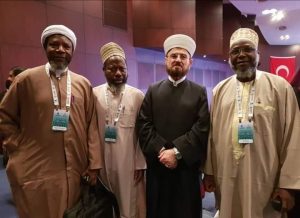
Campaign of calumny against Sheikh Qaradawi and his likes
If you disagree with someone, it does not call for raining abuses on him or fabricating lies against him. I have read so many negative remarks some people wrote about Sheikh Qaradawi and some of us that associate with him. These people even went to the extent of twisting our lectures in order to blackmail us, just because of disagreements over issues of divergent opinions among scholars.
They did it to me a few days ago. I delivered a lecture on ‘Islam and Democracy’, where I presented all the views of the scholars. They selected the part where I presented the view of the scholars who said democracy is Kufr. They cut that part alone and used it as evidence that I condemned voting, whereas I also quoted other views of the scholars who call for Muslims to participate in the electoral process. In fact, I chose the latter and called on the Nigerian Muslims to register for their PVCs and vote, but these misguided elements called it “a lie from a liar”. Do they really fear Allah?
(The original and distorted clips will be published later by Muslim News)
There is no scholar of Islam, except the Prophet (SAW), without one shortcoming or another. Sheikh Qaradawi is not infallible, same as other scholars, but when a person’s good deeds are more than his bad deeds, his good deeds would cover his bad deeds. Scholars such as Imam Malik, Imam Shaafi’ and others have passed fataawah (verdicts) on different issues. If there are differences in our fataawah, that should not result in exchanges of insults or cessation of mutual relationships based on Islamic precepts.
That is the more reason why we have the concept of ‘Differences and Etiquettes of Dealing with Differences’. How do we relate with differences? The Sahaabah had differences among themselves and same occurred among the various schools of thought, such that they even engaged in open and hot debates.
Differences among the Companions
Among the Sahaabah, on the issue of property allocation and distribution, Ibn Abbas and Zayd bn Thaabit had different views. On that, Ibn Abbas challenged those who viewed the issue differently from him to a debate, though he was referring to Zayd bn Thaabit indirectly.
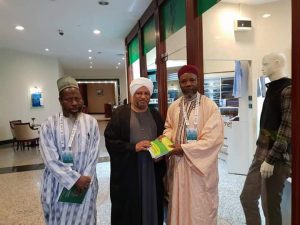
After some time, they met at a Janaazah and Zayd bn Thaabit, as the elder scholar, was to lead the Salatul-Janazah. After the Salah, when Zayd bn Thaabit was climbing his camel, Ibn Abbas went to help him hold the camel like a student helping his teacher open the door to a vehicle. Zayd bn Thaabit asked him to leave it and Ibn Abbas responded; “That is the teaching of the Prophet towards our scholars”.
That is respect to someone who shared differences with him on an issue. Zayd bn Thaabit kissed his hand and said; “This is also the Prophet’s teaching towards relating with the people of his household”. Upon their very hot differences, nonetheless, they still respected each other. This is what we want, not cursing or rubbishing scholars’ good efforts with reckless abandon, as we see today. This was one of the purposes of the conference.
Differences among the Scholars
When the likes of Sheikh Ibn Baaz, Sheikh Uthaymin and Sheikh Albani were alive with Sheikh Qaradawi, they were relating and speaking good of one another despite their differences on some issues. Many good words abound from Sheikh Ibn Baaz to Sheikh Qaradawi, from Sheikh Albani to Sheikh Qaradawi and also from Sheikh Qaradawi to these three scholars.
They never hurled insults on one another, even in the face of differences. In fact, what we heard was that when Sheikh Ibn Baaz died, the Salatul-Janazah (prayer for the dead) was delayed till Sheikh Qaradawi, who was coming from Qatar, arrived.
Is Qaradawi truly a terrorist?
Before the Egyptian Revolution, Sheikh Qaradawi was always in Saudi with the King and Mufti, sitting and hugging. In 2010 or 2012, a programme was held at the period of Hajj. Sheikh Qaradawi was one of the global scholars invited. He headed about three sittings which I witnessed myself, and it was the same Saudi scholars that invited him.
He has been honoured previously by the Kingdom, including his conferment with the King Faisal International Prize for his exceptional service to humanity in religious scholarship. In Dubai, United Arab Emirates, he was given an international award as the Islamic Personality of the Year. But now, he is a terrorist. Why?
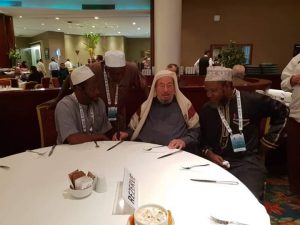
It is Middle East politics and support for the Muslim Brotherhood in Egypt that changed the perception of the Saudi and some Arab leaders about Qaradawi.
It is all about politics. It is the issue of Egypt (the Arab Spring) that brought about the current – and needless – terrorist tag. In the world today, only four countries labelled Sheikh Qaradawi a terrorist, and they are Saudi Arabia, Egypt, Emirates (UAE) and Bahrain. These are the same countries that severed ties with Qatar in 2017 for allegedly supporting terrorists, including Qaradawi and others.
They didn’t stop there. They called on other countries to add him to their terror lists. But their requests were turned down, as many of these Western countries – even the US and UN – didn’t see him as a terrorist.
The world international police, Interpol, in 2017 removed him from its most wanted list after realising that the allegations against him were fabricated by the Egyptian government. You can see why I said it is all about politics.
( Dr Bilal Asra’ speaks more on Sheikh Qaradawi’s verdict on suicide bombing and killing of Gaddaffi in his interview with Muslim News. Watch out)
At the end of the conference, where he (Sheikh Qaradawi) stepped down as the President of the Union for Ahmad Al-Raysuni from Morocco, he said: “My brethren, pray for me. Ask Allah’s forgiveness for me. Anyone I offended should please forgive me, and I have forgiven everyone who offended me.”
These are the words of an elder. When one is about departing this world, what else? He said we should seek Allah’s forgiveness for him because he acknowledged that he offended some, and he has forgiven people because he knows some people also offended him. So, what’s left?
Calling for debates free from unguarded words
Why quarrel and fight when we are not competing for material benefits of this world? All we are seeking is the pleasure of Allah and Al-Jannah Firdaus. Since we don’t want to enter hell, we should meet and interact. This is an open debate free from unguarded utterances. It is not going to be a war. We are not holding grudges against anyone. It is not part of our Manhaj.
Have we ever done any lecture where we insulted them? Go and listen to all our recordings, there is nothing of such. But from them, you hear ‘we are speaking about TMC today’, ‘It’s all about Ikhwan tomorrow’. We say to them, to insult is not of the teachings of Islam and that of the Salafu Salih which they claim to take after.
The term “Salafi” and the division in their ranks
As for someone claiming Salafi, we must also ask him: ‘Which type of Salafi?’ Because there are also factions among them and they don’t like to hear that. They know that they are not united. Their various scholars have written different books. They ask what type of Salafiyyah you are.
The name ‘Salafu Salih’ is a hood name, just like the Ansar – the people of Madinah. We see people who established the body called Ansar. They will be if they behave like them. Someone called Salafi is someone who behaves like them. There is no one who wants to practice Islam without following the guidance of the Salaf. It is not by name.
There is no harm in having names. Some of them now have names like Markaz Ahlu Sunnah and others, and even registered same with the government. When they want to meet, someone is their head, another is secretary and they also have a PRO. What else is called an organisation? What can’t be hidden is what they are trying to cover. They call them ‘La Jama’ah’ – No Group. A group that is saying there is no group.
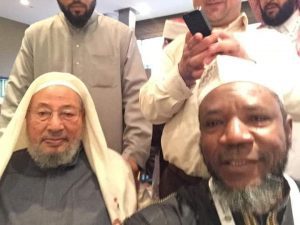
If they want to hold Aqeeqah, is it not their members that would attend? Where there are two or three people coming together, that is a Jamah, with or without names. For the issues that need clarification, we are calling them to a debate, which we think would solve them all. That clearly shows that we are not at loggerheads with them. They are the ones staying away from us.
On tagging Muslims names such as Mubtadi
The manner with which they tag others Mubtadi (Innovators) amazes me. A Kafir (disbeliever), Ibn Mughirah, who was not a Muslim, met with the Prophet (SAW). He talked without interruption from the Prophet. The Prophet even called him by his name in a respectful manner after his speech, and asked if he is done with his speech and he responded in the affirmative. The Prophet responded afterwards.
If the Prophet could talk to a disbeliever at length without interruption, then why say you won’t speak to someone because you tag him Mubtadi? If truly he is a Mubtadi, why abstain from him? How do you want him to move away from his innovation? You can’t get something from someone by insults or curses. It can only be by knowledge. Interaction is the key.
Calling both sides to self-restraint
By both sides, I mean the people that attribute Salafiyyah to themselves and some of our brethren who dissipate their energies on frivolities. They both are not doing what they are meant to do in terms of Dawah propagation in the interest of Nigerian Muslims.
Like I do say, someone that calls himself Salafi and the one who says he is an Ahlu-Sunnah Muslim – irrespective of the Dawah groups they belong to – they both have virtually everything in common. Their points of convergence would not be less than 80%. The remaining 20% would be on issues considered to be Masalatun Khilafiyah (different opinions among the scholars), which do not take one out of Islam. These issues are easy to understand if they are both honest and sincere. They can even reduce to 5%. What’s left?
The Sahaabah were not on the same page on all issues, same as Imam Maliki and Imam Shaafi, and they still they related well with each other. Secondly, learning the etiquettes of differences is very important. Thirdly, abstinence from insults and lies is also crucial, as Allah said in Surah Al-Hujurat that when someone brings news to us, we should investigate (Q 49: 6)
It becomes important for both sides to have the heart of forgiveness and good relationship. We want to enter Paradise together, so we should pray for ourselves as brothers. What joy is in both parties entering hell? Our struggle is mainly for us not to enter hell. Who will know that what he is doing would take him to hell and continue?
Another issue is that we should not be fully inclined and loyal to the words of just a scholar. Imam Ibn Taymiyyah had his Madhhab, same as Imam Nawawi and Imam Ibn Qayyim. Even with their different madhaahib, they listened to others too and accepted what is better than theirs. This is how we ought to be on differences amidst scholars.
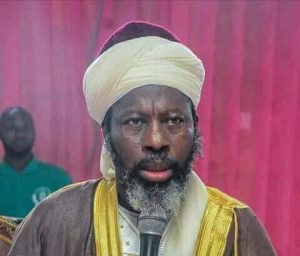


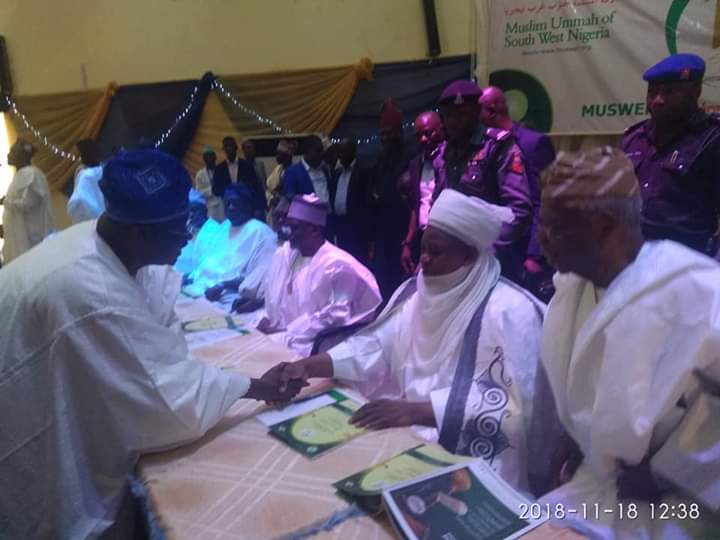

I like Muslim teaching mawaitha quswida and muslims deference sheikh mawaitha in kiswahili and English conference and about muslim
s cultures and Salah and all about religious. Ramadhan ritho in pumwan